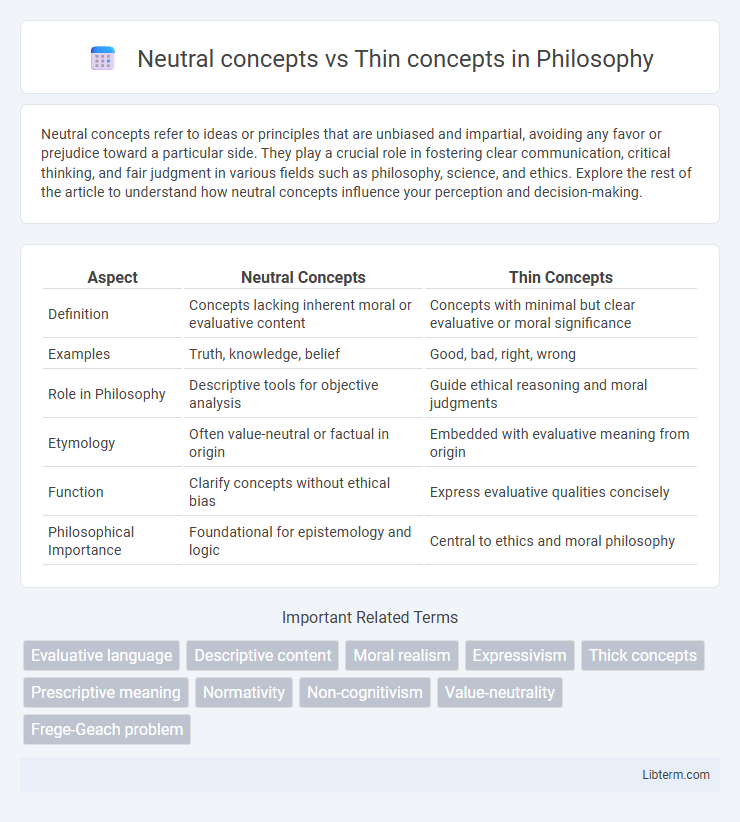Neutral concepts refer to ideas or principles that are unbiased and impartial, avoiding any favor or prejudice toward a particular side. They play a crucial role in fostering clear communication, critical thinking, and fair judgment in various fields such as philosophy, science, and ethics. Explore the rest of the article to understand how neutral concepts influence your perception and decision-making.
Table of Comparison
| Aspect | Neutral Concepts | Thin Concepts |
|---|---|---|
| Definition | Concepts lacking inherent moral or evaluative content | Concepts with minimal but clear evaluative or moral significance |
| Examples | Truth, knowledge, belief | Good, bad, right, wrong |
| Role in Philosophy | Descriptive tools for objective analysis | Guide ethical reasoning and moral judgments |
| Etymology | Often value-neutral or factual in origin | Embedded with evaluative meaning from origin |
| Function | Clarify concepts without ethical bias | Express evaluative qualities concisely |
| Philosophical Importance | Foundational for epistemology and logic | Central to ethics and moral philosophy |
Introduction to Moral Concepts
Neutral concepts in moral philosophy are those that describe actions or states without inherently carrying moral judgment, such as "walking" or "thinking," whereas thin concepts directly express evaluative content, like "good" or "wrong." Understanding the distinction between neutral and thin concepts is essential when introducing moral concepts, as it highlights how language shapes ethical discussions and influences moral reasoning. This differentiation aids in clarifying how moral evaluations are constructed and communicated within ethical theories.
Defining Neutral Concepts
Neutral concepts are characterized by their lack of evaluative or emotional content, serving primarily descriptive or explanatory functions in language and thought. They are defined by objective criteria, factual accuracy, and neutrality, avoiding value judgments or ethical implications. Unlike thin concepts, which embed normative evaluations, neutral concepts provide a clear, unbiased framework for understanding phenomena without influencing attitudes or behaviors.
Understanding Thin Concepts
Thin concepts are evaluative notions characterized by both descriptive content and moral or normative judgment, such as "cruel" or "just." Understanding thin concepts requires recognizing how they simultaneously convey factual information and ethical evaluations within a single term. This dual aspect distinguishes thin concepts from neutral concepts, which only describe without inherent moral implications.
Key Differences Between Neutral and Thin Concepts
Neutral concepts describe ideas or objects without implying any evaluative judgment or emotional weight, focusing purely on factual or descriptive attributes. Thin concepts inherently carry evaluative content, expressing moral, aesthetic, or emotional assessments such as justice, honesty, or beauty. The key difference lies in neutrality of descriptive scope for neutral concepts, versus the embedded normative or evaluative significance in thin concepts.
Philosophical Background of Neutral Concepts
Neutral concepts, rooted in philosophical discourse, challenge the dichotomy between purely positive and negative value-laden ideas by maintaining impartiality in evaluative judgments. They arise prominently in debates within metaethics and phenomenology, where philosophers like Kant and Husserl explore concepts independent of inherent moral or emotional weight. This neutrality allows for objective analysis and facilitates clearer understanding of ideational frameworks without presupposing subjective valuation.
Philosophical Background of Thin Concepts
Thin concepts in philosophy are evaluative terms that embody both descriptive and normative components, distinguishing them from neutral concepts, which are purely descriptive. Rooted in the work of philosophers like Bernard Williams and Elizabeth Anscombe, thin concepts such as "courage" or "cruelty" intrinsically combine factual content with ethical judgment, reflecting moral attitudes. This philosophical background emphasizes that thin concepts cannot be fully understood without acknowledging their embedded value commitments, challenging the separation of facts and values.
Examples of Neutral Concepts in Ethics
Neutral concepts in ethics refer to terms that describe actions or states without immediate moral judgment, such as "causation," "belief," and "intention." Thin concepts, in contrast, embed evaluative content directly, exemplified by words like "good" and "wrong." Examples of neutral concepts include "causation," which explains the relationship between events, and "intention," which details an agent's purpose without implying moral value.
Examples of Thin Concepts in Ethics
Thin concepts in ethics, such as "wrong," "right," "good," and "bad," carry both descriptive and evaluative dimensions simultaneously, allowing moral judgments to be directly expressed. Unlike neutral concepts, which lack intrinsic value judgments, thin concepts embed ethical evaluation within their meaning, making terms like "just," "unjust," "honest," and "dishonest" prime examples in ethical discourse. These concepts facilitate clear moral communication by succinctly conveying evaluative stances without requiring additional context or explanation.
Debates Surrounding Neutral vs Thin Concepts
Debates surrounding neutral versus thin concepts center on the degree to which these concepts carry evaluative content. Neutral concepts aim to remain descriptive and free from value judgments, serving as objective benchmarks in ethical and philosophical discussions. Thin concepts, however, intertwine evaluative and descriptive elements, raising questions about their objectivity and role in moral reasoning.
Implications for Moral Philosophy
Neutral concepts, which lack intrinsic evaluative content, contrast with thin concepts that inherently carry moral or evaluative significance, influencing how ethical judgments are formed and communicated. In moral philosophy, this distinction affects the analysis of moral language by highlighting whether terms encode evaluative commitments or remain descriptively neutral, shaping debates on moral realism and expressivism. Understanding the interplay between neutral and thin concepts informs ethical theory by clarifying how moral concepts contribute to reasoning, motivation, and normativity in moral discourse.
Neutral concepts Infographic

 libterm.com
libterm.com